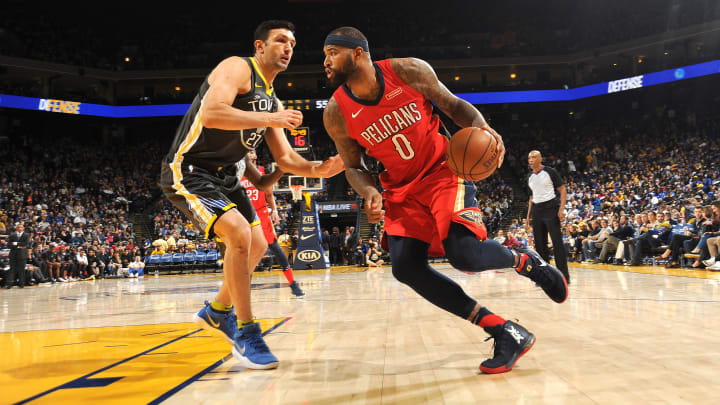Facing a Harsh Free-Agency Reality, DeMarcus Cousins Embraces the Absurd

In the final seconds of a regular season game that had already been decided, DeMarcus Cousins's future shifted beneath him. Cousins had waited his entire career to compete for the playoffs and to play with a teammate as good as Anthony Davis. A painfully routine move—and the torn Achilles tendon that came of it—robbed him of that chance.
Cousins couldn't fully know how that injury would change the market for his services until free agency began. When it did, the All-Star center found that any hopes of signing a long-term or near-max deal had been quashed. Fellow bigs around the league scored sizable deals virtually out of the gate: DeAndre Jordan with the Mavericks, Aaron Gordon with the Magic, Derrick Favors with the Jazz, Jerami Grant with the Thunder. Cousins, on the other hand, did not receive a single contract offer, according to Marc Spears of The Undefeated.
“I was shocked," Cousins told Spears. "I didn’t believe it. It was a rough, pretty emotional night."
The DeMarcus Cousins Experience Isn’t for Everyone, but Warriors Are More Than Ready
Some teams have legitimately refused to pursue Cousins under any circumstances, believing his personality to be antithetical to winning basketball. Others were understandably spooked by his injury; to tear an Achilles is a career-altering event for a basketball player, and an empirical suggestion that they may never be the same again. Factor in that only a few teams were in the market for a center to begin with and that Cousins is unlikely to be court-ready for the start of the season, and what interest there might have been dissipated.
There had obviously been discussions between Cousins's representatives and the Pelicans, reportedly with some financial specifics conveyed. Clearly, Cousins didn't regard those exploratory talks as a real offer. One can understand why a player who averaged 25 points, 13 rebounds, and five assists last season would want something more than a meeting on the books in a few days, particularly in a market moving as fast as this. Had he played out the process with New Orleans, the Pelicans would likely have made some kind of proposal. At that point, however, Cousins would have even fewer options and dwindling leverage.
Instead, he got creative. According to Spears, it was Cousins who called Warriors GM Bob Myers to make him an offer he couldn't refuse. This wasn't a Golden State power play; it was a moment of clarity from a free agent whose max-money prospects dissolved into thin air. In the absence of the kind of deal he had been striving for, Cousins interrogated his priorities and wound up a Warrior.
Had the Pelicans wanted to keep Cousins off the market, they could have. Instead, they signed Julius Randle, who should be a help to New Orleans in the first of Davis's final two years under contract. Considering the stakes involved, one can understand why a franchise burned by the injuries of Jrue Holiday, Eric Gordon, Tyreke Evans, and Ryan Anderson in recent years might balk on committing to Cousins. There is literally nothing more important to the Pelicans as an organization than their ongoing case for Davis to stay. Reasonable people can disagree as to how Cousins's departure fits into that, though caution clearly won the day.
Cousins, in response to his previous team looking out for itself, made the best move for him. Playing for Golden State offers him a chance to live in a pleasant team culture as he undergoes a no-rush rehabilitation. There is no danger whatsoever of Cousins's team missing the playoffs if he doesn't get back on the court in time. And once he does return, Cousins will ease his way back through limited minutes and manageable workloads.
The bar has been lowered so that even a star leaping off a torn Achilles could clear it. Golden State doesn't need Cousins to be Cousins, which would be a dispiriting thought were these normal circumstances. They are not. Cousins won't roll out in December or January to dominate in the ways we're accustomed. He'll play a role—the kind that makes sense for a player slowly working his way back from a genuinely devastating injury. His points of comparison aren't other All-NBA bigs, but Warriors starting centers past—the Kevon Looneys, the JaVale McGees, and the Zaza Pachulias.
Inside Decision 3.0: LeBron James Follows in the Footsteps of Legends
There was actually some grousing within the league when the Warriors signed Pachulia for the room exception back in 2016. The response to Cousins has been even more intense, as befits his more extreme case. Nothing about this arrangement is typical, though that in itself is a further credit to Golden State and all they have built. That any team could compel a superstar—even an injured one—to pick up the phone and inquire about the mid-level exception is astounding. It is the most compelling proof yet of the "light years" glow: a purely incidental signing of one of the most talented players in the league.
The Warriors couldn't give Cousins the contract he wanted, but they could offer most everything else. The starting center spot is his for the taking, just as soon as he works his way back at his own pace. All the while, Cousins will experience one of the highest-functioning organizations in sports from the inside. Sacramento will seem like a bad dream. All around the Warriors are the fruits and roots of their winning culture—the work, the attitude, the impervious chill. This could be a genuinely transformative year for Cousins, whose advocates have long hoped that he might find his way to this sort of workplace.
And in nine months, health willing, Cousins will make the first postseason appearance of his career.

Rob Mahoney is an NBA writer dedicated to the minutiae of the game of basketball, its overarching themes and everything in between. He joined the Sports Illustrated staff in 2012.